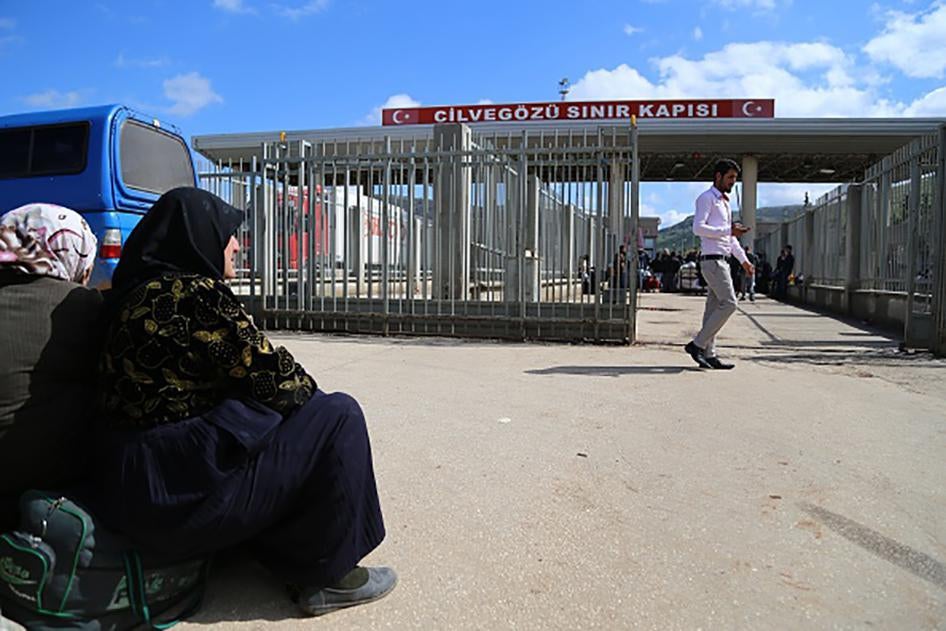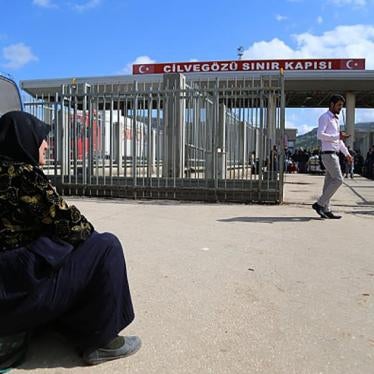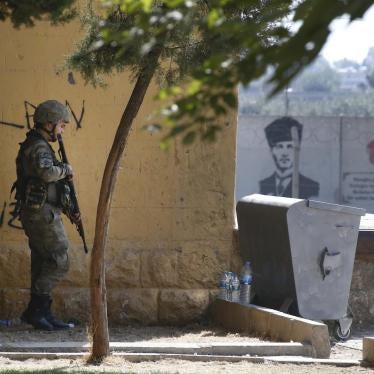(Beirut) – Turkish authorities in Istanbul and Antakya arbitrarily detained and deported dozens of Syrians and possibly many more to northern Syria between January and September 2019 despite active hostilities there, Human Rights Watch said today. Deported Syrians said that Turkish officials forced them to sign forms they were not allowed to read, in some cases after beating or threatening them, and transported them to Syria.
In late July, Interior Minister Süleyman Soylu denied that Turkey had “deported” Syrians but said that anyone “who voluntarily wants to go back to Syria” can benefit from procedures allowing them to return to unspecified “safe areas.” Human Rights Watch research directly contradicts this, finding that Turkey has unlawfully deported Syrians to Idlib governorate, one of the most dangerous areas in Syria. The Syrian-Russian military alliance’s attacks on Idlib governate and surrounding areas have resulted in the deaths of at least 1,089 civilians since April, according to the United Nations, including at least 20 deaths in an August 16 airstrike on a displacement compound.
“Turkish officials’ claims that all Syrians returning to their country are happy to go ring hollow in the face of evidence to the contrary,” said Gerry Simpson, associate crisis and conflict director at Human Rights Watch. “Turkey hosts four times as many Syrians as the European Union, but that does not mean it can return them to a war zone.”
On September 24, Turkish President Recep Tayyip Erdoğan told the UN General Assembly that Turkey would seek to set up a safe zone in territories held then by the Kurdish-led Autonomous Administration in northeastern Syria to which between one million and three million Syrian refugees could be returned. Following the withdrawal of United States forces and a Turkish military incursion, on October 22, Turkey and Russia agreed to joint patrols of most of the Syrian-Turkish border formerly held by Kurdish-led forces. Human Rights Watch said that “safe zones” established during other conflicts have rarely been safe, and establishing one cannot be used to justify forcibly returning refugees.
Turkey shelters 3.65 million Syrians under a “temporary protection” regulation Turkish authorities say automatically applies to all Syrians seeking asylum. This reflects the UN refugee agency’s position that “the vast majority of Syrian asylum-seekers continue to…need international refugee protection” and that “states [should] not forcibly return Syrian nationals and former habitual residents of Syria.”
Human Rights Watch spoke with 12 Syrians by phone about their arrest and detention in Turkey and deportation to Idlib, with 2 Syrians in person who fled Idlib after being deported there and who returned to Turkey, and with the wife of a man deported from Istanbul.
Thirteen said they were deported by bus between July and September. Three said the other bus passengers, a total of about 100, told them they were being returned to Syria against their will. Human Rights Watch said this raised concerns that Turkey has deported significant numbers of Syrians from Istanbul and Antakya in recent months to Idlib.
A Syrian man from Idlib governorate who had been in Turkey since 2013 said he was arrested on July 17 in Antakya while trying to update his personal information. He said that Turkish immigration officials hit him in the face and forced him to sign a voluntary return form. The next day, they put him on a bus with about 30 people headed to the border. “Everyone said they had been pressured into signing a form and one of the women was crying, saying the officials had hit her in the face to force her to sign,” he said. “No one on that bus wanted to go back to Syria.”
None of the 15, some of whom were detained for up to 6 weeks before they were deported, were charged with any offense or allowed to challenge their detention with officials or before a judge. Despite Turkish laws guaranteeing representation to anyone being deported, only one person interviewed said he had found a lawyer who was able to prevent his deportation. Some had no time to ask for a lawyer as they were deported so quickly, while immigration officials told others they did not need a lawyer, or they could not afford legal fees. Most of those who did pay said they never saw the lawyers again.
Turkey’s Interior Ministry should ensure that police officers and immigration officials do not use violence against Syrians or other detained foreign nationals and should hold any officials using violence to account, Human Rights Watch said. Turkey should allow the United Nations High Commissioner for Refugees (UNHCR) to freely access removal centers, monitor the process of obtaining Syrians’ permission to return them to Syria to make certain it is voluntary, and observe interviews and removal procedures to ensure that police or immigration officials do not use violence against Syrians or other foreign nationals.
On October 15, Human Rights Watch shared its findings with Turkey’s Interior Ministry and requested comment, but did not receive any.
Turkey is a party to the International Covenant on Civil and Political Rights and the European Convention on Human Rights, both of which prohibit arbitrary arrest and detention and inhuman and degrading treatment. If Turkey detains a person to deport them but there is no realistic prospect of doing so, including because they would face harm in their country, or the person is unable to challenge their removal, the detention is arbitrary. Any Syrian suspected of a breach of Turkish civil or criminal law should be prosecuted only if formally charged and should have the opportunity to defend themselves in a court of law, or be released.
Turkey is also bound by the international customary law of non-refoulement, which prohibits the return of anyone to a place where they would face a real risk of persecution, torture or other ill-treatment, or a threat to life. Turkey also may not use violence or the threat of violence or detention to coerce people to return to places where they face harm. This includes Syrian asylum seekers, who are entitled to automatic protection under Turkish law, including any who have been blocked from registration for temporary protection since late 2017.
Under its March 2016 deal with Turkey, the EU maintains that Turkey is a safe country to which to return Syrian asylum seekers. Turkey has never met the EU’s safe third country criteria and the recent deportations from Istanbul show that any Syrian forcibly returned from Greece would face a risk of onward refoulement to Syria.
The EU spent at least 55 million euros to support Turkish immigration reception and detention centers between 2011 and 2015 and continued its migration management support under the 2016 deal. It should continue to support the registration and protection of Syrian refugees in Turkey, but the European Commission should publicly report on Turkey’s deportations to Syria and, together with EU member states, should publicly call on Turkey to stop the deportations and allow UNHCR to monitor whether detained Syrians wish to remain in Turkey or voluntarily return to Syria.
“With the Syrian conflict recently taking another deadly turn, the EU should be helping Turkey respond to a reality that requires ongoing protection for millions of refugees,” Simpson said. “That means protecting Syrians who reach EU shores, resettling Syrians from Turkey to the EU, and pressing Turkey to use its resources, including EU support, to protect refugees rather than forcing them back into harm’s way.”
Turkey’s Increasingly Restrictive Syrian Refugee Policies
Since 2011, Turkey has taken in millions of Syrians and given them protection, with almost all of the country’s current 3.65 million registered Syrians given temporary protected status by early 2017. But Turkey’s recent deportations of Syrians from Istanbul and Antakya result from policies that have increasingly denied large numbers of Syrian asylum seekers protection.
Over the past four years, Turkey has sealed off its border with Syria, with hundreds of thousands of Syrians now trapped with little assistance in displacement camps and villages on the other side of the closed border. Turkish border guards have carried out mass summary pushbacks and killed and injured Syrians as they try to cross. In late 2017 and early 2018, Istanbul and nine provinces on the border with Syria suspended registration of newly arriving asylum seekers. Turkey’s travel permit system prohibits Syrians from traveling from the border provinces they enter to register elsewhere in the country.
On July 22, the Istanbul provincial governor issued a statement saying that Syrians in Istanbul registered in one of the country’s other provinces must return there and that the Interior Ministry would send unregistered Syrians to other provinces to register. The authorities have not published any information since about the number sent elsewhere to register and where they have been registered.
The July statement came amid rising xenophobic sentiment across the political spectrum against Syrian and other refugees in Turkey, with increased calls by some politicians and sectors of the electorate for Syrians to go home.
Detailed Accounts by Deported Syrians
Human Rights Watch spoke by phone with 12 Syrians and in person with 2 Syrians who had returned to Istanbul and Antakya about their deportations to Syria, and, in Istanbul, with the wife of a deported man. Thirteen of those interviewed were deported between July and September, including one man who was deported with three of his sons. One was deported in January and the other in April. All but one were deported to Idlib governorate through the Cilvegözü/Bab al-Hawa border crossing.
The deported Syrians interviewed said that police in or near Istanbul and Antakya had detained them and then, in most cases, handed them over to immigration authorities, who held them for periods ranging from a few hours to 42 days, without bringing any charges, and then deported them.
The Syrians said that police or immigration officials told them they were being detained for a variety of reasons, including that they did not possess protection permits, that their permits had expired or contained clerical errors, that their permits were registered outside Istanbul, that they lacked work permits, or because of disputes with neighbors. Eleven of those interviewed were registered and four were unregistered. Given the ongoing armed conflict, generalized violence, and widespread human rights violations in Syria, the expiration or lack of temporary protected status does not entitle Turkey to deport Syrians, Human Rights Watch said.
The people interviewed had been forced to sign forms in police stations or in removal centers and said that they suspected the forms said they wanted to return to Syria. They said that officials did not allow them to read the forms and did not explain what the forms said. Some said that officials used their hands to cover part of the form written in Arabic. Most said they saw authorities at these removal centers processing other Syrians in the same way.
These findings echo a statement from Istanbul’s Bar Association that between early July and about August 20, it had received 180 complaints of police misuse of voluntary return forms stating that the person wishes to return to Syria. They also echo the accounts of four other deported Syrians given to Human Rights Watch in July.
Five deported Syrians said that officials slapped or hit them to coerce them into signing a form whose purpose officials refused to divulge. Two said they saw officials hitting other Syrians while telling them to sign a form. Three said officials repeatedly shouted at them to sign, with some threatening violence or to detain them until they signed. One person said an official held onto his hand and physically forced him to sign. Two said they saw officials beating other Syrians on a bus from Istanbul to the Syrian border.
Two Syrians said that they were deported within hours of being detained so they had no time to ask for a lawyer. Four said they did not ask for a lawyer because officials had lied, saying they were not going to be deported. Another eight said they could not afford to pay lawyers who asked for as much as US$1,500, although some reduced their request to $350. Three Syrians said they managed to pay the legal fees, but that the lawyers just disappeared or failed to act on their behalf.
All of those interviewed said they were taken to the Syrian border in a minibus or large coach full of Syrians. They said that based on conversations they overheard in the removal center before they were put on the bus, as well as conversations on the bus, they believed that many were being deported. However, only three said that they knew from detailed conversations they had during the long journey that all the people on their bus were, like them, being returned to Syria against their will.
A man from Hama city who had been in Turkey for three years and who was deported from Istanbul on July 24 said:
I was deported with about 35 Syrians on a large bus. They handcuffed us and the journey to Bab al-Hawa [border crossing] took 21 hours. They beat some of the men on the bus with truncheons when they asked to go to the toilet or for water. We all spoke with each other at various points and all of us said we were being deported. No one wanted to go back to Syria.
Most of the people interviewed could not name the police station or removal center where they were held, but some said they were held in immigration removal centers in Çatalca and Pendik in Istanbul. A number of those who had been held in Antakya said they were deported from an immigration authority facility in the city known by Syrians as “Amniyat [Emniyet] 500.”
Five said that officials used violence to coerce them into signing a form, while two also said they saw officials hitting other Syrians who were being pressured to sign a form.
Police arrested a 25-year-old man from Idlib city in mid-July in Antakya and took him to the “Amniyat [Emniyet] 500” facility. He said:
There they asked everyone to sign a paper that said we wanted to go back to Syria. Most of the others did but some of the others and I refused. I said my life would be in danger in Idlib and the officer said, “You are lucky we are sending you to Idlib and not to Assad.” … I asked for a lawyer but they didn’t respond and said all of us would be taken to the border as soon as the governor had signed the papers.
Then at about midday they called out the names of everyone who had refused to sign. We went into another room, one by one. Officials in the other room shouted at others who went in before me and some of the Syrians cried. I spoke to some of them when they came out and they said that the officials had shouted at them to sign until they did.
They called my name and I went in and two men shouted at me to sign the paper on the table and that I would be returned to Syria because I was in Turkey illegally. One of them hit me in the face. The next time he raised his hand to hit me, I raised mine to protect my face. He shouted at me “I am an official, don’t raise your hand at me.” They treated me and everyone else like criminals. I continued to refuse to sign the document, but they deported me anyway.
A man from Homs who entered Turkey in May and was arrested on August 6 in Istanbul said that police took him to a removal center in Çatalca, where he saw a Turkish Red Crescent symbol and an EU flag on the walls. He said:
The next day, on a Friday, they told a few of us to sign statements. One of the men, who had been in Turkey for five years, refused to sign. Two gendarmes [rural police], wearing red and with “jandarma” written on their back, and holding batons, took him out of our room, and they beat him up to within an inch of his life. He came back in unable to walk. He still refused to sign. One person said that they had signed documents on his behalf. They deported him a week later, on a Friday.
Three other Syrians described officials repeatedly shouting at them to sign, with some threatening violence and others threatening to detain them until they signed.
A 34-year-old man from Aleppo who was deported from Istanbul at the beginning of July said that his pregnant wife and two daughters were still in Istanbul. He was living in a displacement camp near the village of Atma, close to the Turkish border, sharing a tent with eight other people. He said:
In early June, the police arrested me in front of my workplace and took me to an immigration center in Çatalca and held me there for a month. From day one, they told me to sign a document many times and I refused. Each time they said, “You will sign and go back to Syria.” During those four weeks, the boss there said things like, “You will stay here for the rest of your life if you don’t sign” and, “Whether you sign or not, the decision has already been taken and I will sign for you.”









